Tag: Russia
Stevenson’s army, March 10
– Alerted by FT’s John Thornhill, I want to share the UK Defence Ministry’s commissioned Sci-Fi stories to help think about future warfare.
– Lithuanian intelligence says Russia can fight two more years at current pace in Ukraine.
– NYT reveals what Saudis want from US in return for normalizing relations with Israel.
– There still aren’t many budget details for defense and foreign policy. Defense News has this summary.
– And Indopacom has leaked its wish list.
– Politico notes European differences over China.
– Max Boot confesses he has been wrong about foreign policy.
– WaPo earlier had interesting maps about US & Ukraine.
My SAIS colleague Charlie Stevenson distributes this almost daily news digest of foreign/defense/national security policy to “Stevenson’s army” via Googlegroups. I republish here, with occasional videos of my choice. To get Stevenson’s army by email, send a blank email (no subject or text in the body) to stevensons-army+subscribe@googlegroups.com. You’ll get an email confirming your join request. Click “Join This Group” and follow the instructions to join. Once you have joined, you can adjust your email delivery preferences (if you want every email or a digest of the emails).
The easy way out leads to failure
I spoke yesterday at a US-Europe Alliance panel on the impact of the Russian invasion of Ukraine in the Western Balkans. Here are my notes:
Let me start by making three point I regard as obvious:
- Russian military aggression in Ukraine has a counterpart in the Balkans There the aggression is via hybrid warfare directed from Serbia, mainly against Kosovo, Bosnia and Herzegovina, Montenegro, and Macedonia.
- If Russia succeeds in gaining territory in Ukraine, we should expect a far more aggressive effort in the Balkans.
- If Russia fails in Ukraine, it will fail as well in the Balkans.
Why?
Why then, you should ask, has the State Department been so soft on Serbia, Russia’s main agent in the Balkans? The US has allowed billions of dollars of development bank investments to go to Belgrade. The Pentagon is trying to revive military cooperation with the Serbian army. The State Department backed unproductive and unjustified decisions by the HiRep in Bosnia that favored Croat extremists and sanctioned Serbs. American officials befriended and encouraged a narrowly elected pro-Russian government in Montenegro. They have insisted on early formation of an Association of Serb-majority Municipalities in Kosovo, a proposition that would weaken the still young Kosovo state.
Some regard these moves as recent. But they are better regarded as part of a long history of taking the easy way out in the Balkans. As difficult as they were, the Dayton accords seemed easier to Washington in 1995 than defeat of Republika Srpska. After Milosevic fell to the 2000 election in Serbia, the Americans quickly gave unequivocal support to his successors. They cut off funding to the Otpor Resistance movement that intended to keep a sharp eye on the democratization process. Senator Biden argued in a hearing several years later that it would be better to get Serbia into the EU accession process than to insist it earn candidacy on the merits.
Serbia’s response
The Serbian government took advantage of that support to reject the Ahtisaari plan for Kosovo’s independence. It instead established Serbia as a militarily “neutral” country. Belgrade rearmed as best it could, mainly with Russian help. When Serbia’s disappointing but relatively liberal “democrats” lost the 2012 election, Washington lined up behind their nationalist successors.
Many thought they could be convinced to resolve the Kosovo issue in a “Nixon to China” move. Presidents Nikolic and then Vucic declined to do so. President Vucic’s minions now talk openly about a “Serbian world.” That is analogous to Vladimir Putin’s “Russian world” and a synonym of Greater Serbia. It is only a matter of time before Serbia walks away from the French-German proposed agreement that Vucic refused to sign last month.
Washington however has been unresponsive and ineffective. Vucic’s unwillingness to sign, Republika Srpska’s “national day” display of force, Belgrade’s threats of military action in Kosovo, the Bosnia HiRep’s decision to change the way votes are counted the day after an election, the compromise of NATO secrets by Montenegro’s pro-Russian government, control of the press, harassment of liberal democrats, and corruption in Serbia—none of these developments have elicited an effective response from Washington.
Unedifying
The explanation is far less than edifying. Washington doesn’t give a hoot about the Balkans. The region is too complicated, too peripheral, too aggravating. So it delegates hegemony to a “pivotal state.” The State Department thinks that is Serbia, which is central geographically, larger than its neighbors, a bit better off economically, and a far more consolidated state than the other former Yugoslav republics.
If you delegate a pivotal state to control a region, you have to put up with most of its behavior, both in the region and at home. If the pivotal state in addition maintains good relations with your adversaries, you will fear a tilt in that direction. Hence the US government’s reluctance to call out Belgrade, even when it sides with Moscow and Beijing in foreign policy and slides inexorably toward autocracy at home.
This is a sad commentary, not only on American diplomacy. It sadly favors a Russian proxy over states truly aspiring to join the West. That’s ugly. But it is also sad for the region, which has good reason to fear instability. Bosnia, Kosovo, and Montenegro all face threats to their sovereignty and territorial integrity as a result of America’s treatment of Serbia as the pivotal state in the Balkans.
But it is sad also for Serbia, which no longer meets the Copenhagen democracy criteria for EU membership. Vucic can do what he pleases domestically, without concern about constraints on his power. And it is sad for Kyiv, which should worry that whatever the Americans agree in the Balkans they may copy in Ukraine. How about an Association of Russian-majority municipalities in Donbas?
To put it plainly: the easy way out leads to failure.
PS: Take a moment to look at Demush Shasha’s pertinent tweets from today:
Four important takeaways from today’s @freedomhouse “Freedom in the World 2023” report.
1. Kosovo is democratic trailblazer of the region. Kosovo made record annual democratic improvement and ranked as third most improved democracy in the world in 2022.
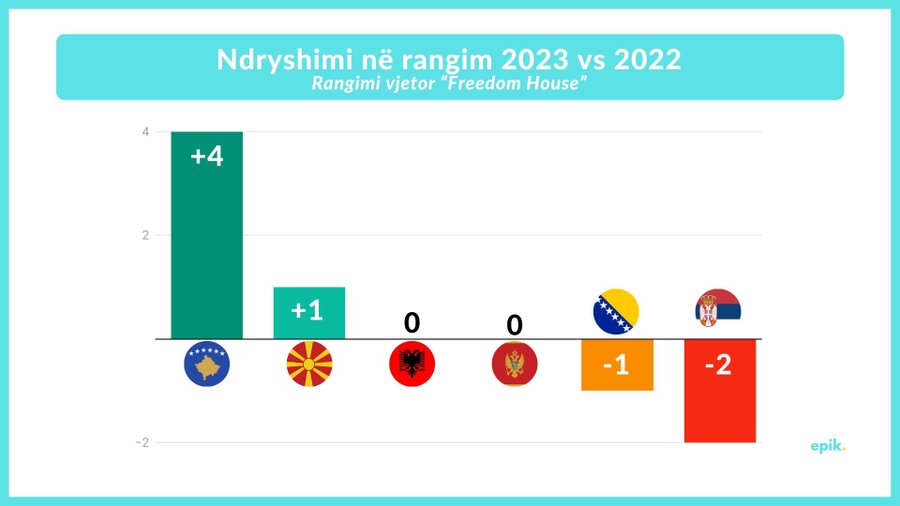
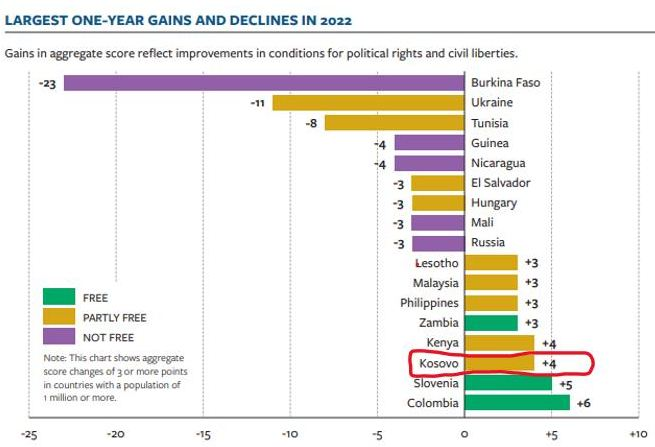
2. Kosovo and Serbia democracies are heading to totally opposite directions.
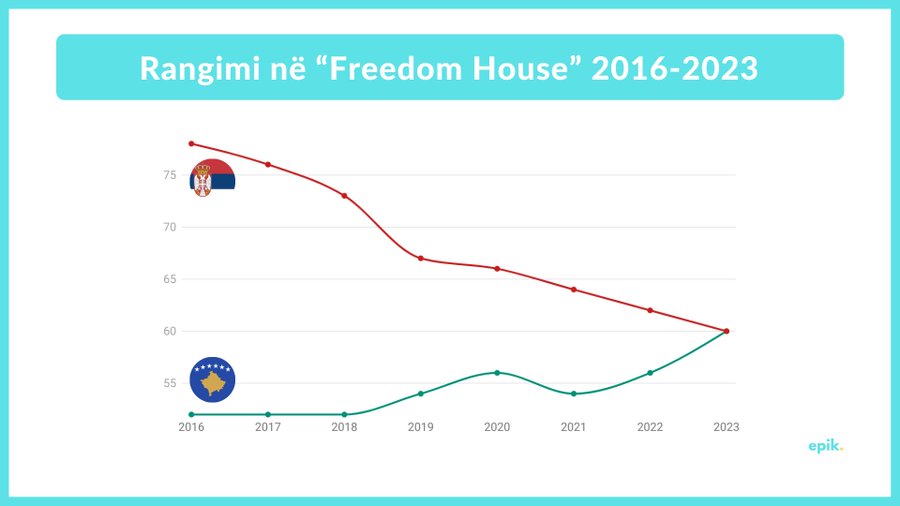
3. Looking at a longer time scale, only Kosovo and North Macedonia have today a better democracy then a decade ago. Albania has made no progress, while Serbia, Montenegro and Bosnia have worst democracies today then a decade ago.
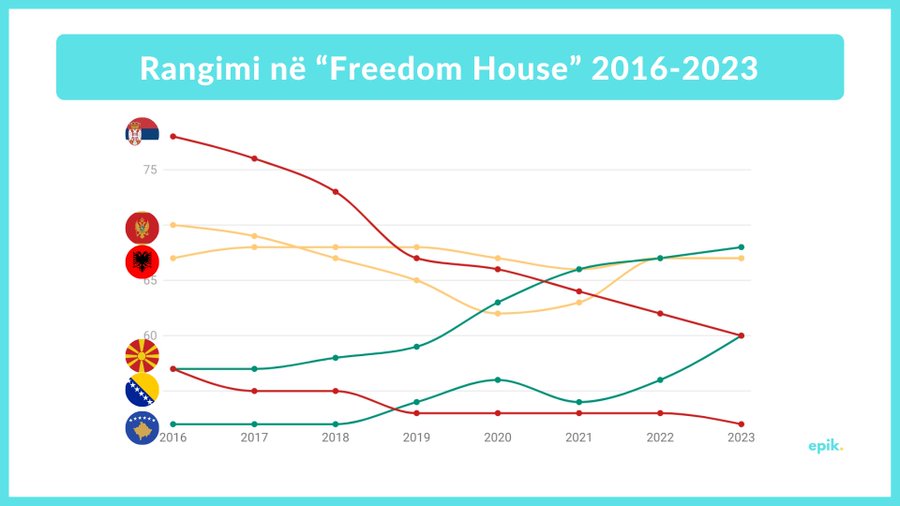
4. Serbia’s democratic collapse is in particular staggering. A decade long democratic nosedive has put it now in a category with Afghanistan and Myanmar.
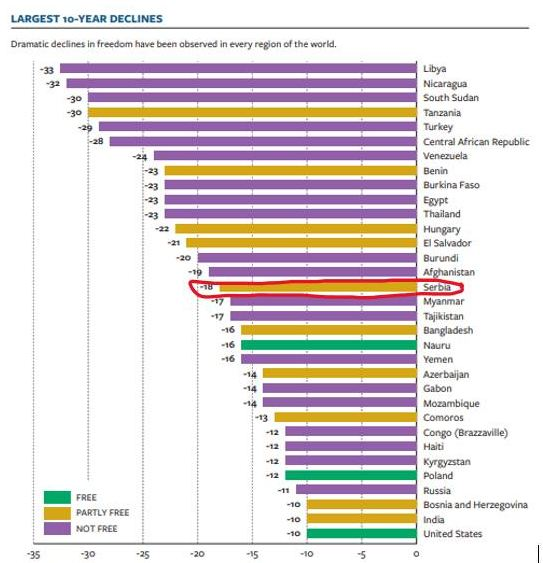
Stevenson’s army, March 6
– Two stories reveal the nature of the fight in Ukraine. WSJ on Russia’s deadly attacks, NYT on trench warfare.
– Scholz says China won’t send Russia weapons.
– Iran promises IAEA to turn cameras back on.
– DOD worries that Chinese cranes can spy.
– Politico reprises earlier debt limit fights.
– House GOP boosts committee budgets.
My SAIS colleague Charlie Stevenson distributes this almost daily news digest of foreign/defense/national security policy to “Stevenson’s army” via Googlegroups. I republish here, with occasional videos of my choice. To get Stevenson’s army by email, send a blank email (no subject or text in the body) to stevensons-army+subscribe@googlegroups.com. You’ll get an email confirming your join request. Click “Join This Group” and follow the instructions to join. Once you have joined, you can adjust your email delivery preferences (if you want every email or a digest of the emails).
Stevenson’s army, March 1
– USAID has guidance to fight corruption. More from New Yorker re Ukraine..
– USD(P) explains opposition to F16s.
– NYT explains CHIPS Act. WSJ’s Greg Ip sets background.
– GZEro has graphic on aid to Ukraine.
– NYT explains Russia’s failing tank tactics.
– NYT says Netanyahu is losing his grip.
My SAIS colleague Charlie Stevenson distributes this almost daily news digest of foreign/defense/national security policy to “Stevenson’s army” via Googlegroups. I republish here, with occasional videos of my choice. To get Stevenson’s army by email, send a blank email (no subject or text in the body) to stevensons-army+subscribe@googlegroups.com. You’ll get an email confirming your join request. Click “Join This Group” and follow the instructions to join. Once you have joined, you can adjust your email delivery preferences (if you want every email or a digest of the emails).
– House committee reports a batch of China bills.
– WaPo dings Haley for misleading statements about foreign aid.
– Writer urges expansion of House.
How to assess a Pristina/Belgrade agreement
My Balkanite friends are clamoring to know what is going to happen tomorrow when Serbian President Vucic and Kosovo Prime Minister Kurti meet once again. The Europeans and Americans are pressing hard for a “normalization” agreement. No one knows quite what that means.
But I have some ideas about how to evaluate whatever happens tomorrow. These come from my personal perspective, which supports the sovereignty, territorial integrity, and independence of Kosovo. Those who imagine Serbia ever again governing Kosovo, or annexing part of its territory, need read no further.
My assessment criteria include these:
Improved state-to-state relations
Normalization should mean making the relationship between Serbia and Kosovo more like a “normal” state-to-state relationship between respectful neighbors. This requires agreement, at least in principle, on the line of control between them. A commitment to agree and demarcate that line would be a clear positive signal. Normalization should also mean forswearing the threat or use of force to settle disputes. Serbia has recently mobilized its army and threatened the use of force in response to imagined abuses against Serbs in Kosovo.
Good neighbors need however to do more than respect a line and not use force or threats of it. They need also to respect their neighbor’s state institutions. This applies in particular to Belgrade. Serbian state security and other personnel remain in the Serb communities inside Kosovo. The situation is especially egregious in the four northern municipalities contiguous with Serbia. But Serbian security agents intimidate Serbs throughout Kosovo who seek to join the Kosovo Security Force (KSF) and other Kosovo institutions.
Belgrade should welcome, not resist, the recruitment of Serbs into the KSF and other Kosovo institutions, especially the police and judiciary. Return of the Serbs to those institutions in northern Kosovo should be a touchstone in assessing whatever is agreed. So too, should be elections in the northern municipalities, held under the authority of Pristina.
Reciprocity
Reciprocity is a critical dimension of any state-to-state relations. It has been lacking in the loud international community insistence on the formation inside Kosovo of an Association of Serb-majority Municipalities (ASM). Pristina has asked for a reciprocal Association of Albanian-majority Municipalities inside Serbia with comparable powers, but Belgrade has not welcomed that idea. Pristina is also insisting that the ASM be formed consistent with the Kosovo constitution. That would mean without executive powers and without a sectarian name. It would be a purely consultative body not limited to Serb participation.
Serbia however wants the ASM as a means of permanent control over the Serbs in Kosovo and leverage over the Kosovo state. It has no intention of conceding anything comparable to the Albanian population in southern Serbia. If a unilateral ASM with executive powers is permitted, you can expect trouble not only in Kosovo but also in Bosnia and Herzegovina. There the main Serb leader has said bluntly it would be a prelude to independence for the 49% of the territory known as Republika Srpska.
If the ASM were to be formed before Belgrade recognition of Kosovo in an agreement generated by the US and the EU, that would give the ASM even more implicit EU approval than the Kosovo state itself. No government in Pristina should want that to happen. The ASM should be formed only after Serbian (and presumably then all-EU) recognition.
International engagement
If implementation is left up to Belgrade and Pristina, the results will be predictably minimal. They have already spent more than 10 years discussing the Brussels agreement that introduced the ASM and called for application of the Kosovo police and judicial systems in the northern municipalities. Unless the international community seriously engages, we can expect no better in the next 10 years.
That engagement can come in several forms. One would be formation of an implementation task force in which the EU and US act as guarantors, prepared to intervene actively and effectively in pointing out implementation failures of that sort. A body of this sort could deliver on promises American officials have already made ensuring the sovereignty, territorial integrity, and independence of Kosovo. The International Civilian Office that supervised Kosovo’s implementation of the Ahtisaari Plan after independence might be a model.
Another form of international engagement would be recognition by the five EU states that have not already done so. That could soften the blow of unilateral formation of the ASM, without a comparable association inside Serbia. All five might be more than one can hope for, but several would be good. Even one would be desirable. None will lead to serious disappointment in Kosovo.
NATO could make its position on future Kosovo membership, after its army is fully accredited in 2027, clear and unequivocal.
Financing is another possibility. Serbia has already received a major grant for railway reconstruction. Kosovo has received nothing comparable. It should.
Minimal outcome
Serbian President Vucic has for years fed Serbia’s tabloids a diet of anti-Albanian racism that has fired up his nationalist opposition. That includes expressing his personal regret that Serbia released Prime Minister Kurti from prison. Russian bots and agents pitch in frequently. Kurti indulges in less overt hate speech. He also has more support at home for an agreement, but only if it does not infringe on Kosovo’s sovereignty and territorial integrity. He is implacable on that subject.
One or the other leader, or both, may walk away from tomorrow’s meeting unwilling to sign. Either would likely increase in domestic popularity if he did so. Democracy, in this case, is the enemy of conflict resolution, because the leaders have not prepared their constiuents for compromise. Only international pressures and inducements can compensate for domestic unhappiness. The US and EU, if they get an agreement, will need to continue to engage.
PS: As I have left out mention of Ukraine, let this letter from Prime Minister Kurti to President Zelensky fill the gap:
Stevenson’s army, February 24
Lots of media reviews, assessments, and forecasts on the Ukraine war
NYT on Biden-Zelensky relationship
My SAIS colleague Charlie Stevenson distributes this almost daily news digest of foreign/defense/national security policy to “Stevenson’s army” via Googlegroups. I republish here, with occasional videos of my choice. To get Stevenson’s army by email, send a blank email (no subject or text in the body) to stevensons-army+subscribe@googlegroups.com. You’ll get an email confirming your join request. Click “Join This Group” and follow the instructions to join. Once you have joined, you can adjust your email delivery preferences (if you want every email or a digest of the emails).




 RSS - Posts
RSS - Posts
